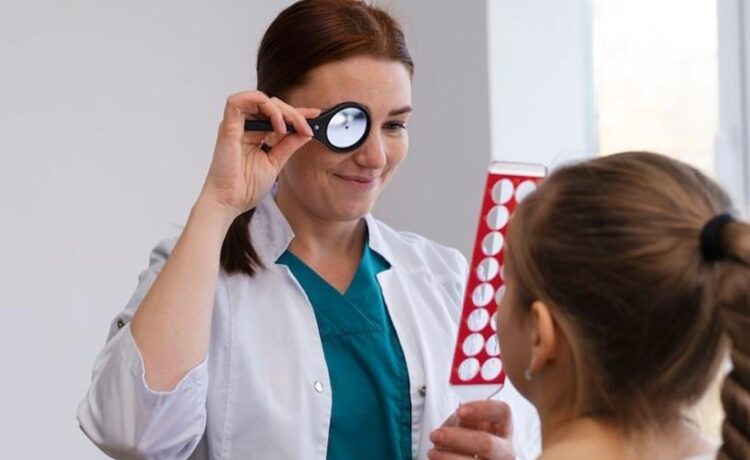Importance Of Regular Eye Exams
Your eyes are vital for experiencing the world and need regular care to stay healthy. Routine eye exams are crucial for everyone, regardless of current vision quality. They help detect and treat potential issues early, preserving your vision and preventing serious problems. Prioritize eye exams to maintain optimal vision and overall eye health.
Benefits Of Regular Eye Exams For Children
Regular eye exams are crucial for children as their visual system develops rapidly in the early years. These exams help detect and address issues like refractive errors, amblyopia (lazy eye), and strabismus (misaligned eyes) early on, affecting learning and activities. Timely treatment, such as corrective lenses or vision therapy, supports healthy visual development and prevents long-term complications. Additionally, eye exams track visual milestones and ensure children meet developmental and academic goals.
Common Eye Conditions In Children
Common eye conditions in children include refractive errors such as nearsightedness, farsightedness, and astigmatism, where improper light focus causes blurred vision. These issues often become noticeable during school years due to increased close-up activities. Amblyopia, or “lazy eye,” results in one eye having poorer vision than the other, often due to refractive errors or misalignment. Without early treatment from an eye doctor, it can lead to permanent vision loss. Strabismus, or misaligned eyes, can cause double vision and depth perception problems. Prompt treatment by an eye doctor is crucial to prevent complications like amblyopia.
Early Detection And Prevention Of Eye Problems In Children
Regular eye exams are crucial for detecting and preventing vision problems in children. These exams use age-appropriate tests to assess visual acuity, eye alignment, and overall eye health. For young children, simple screenings check for refractive errors and eye misalignment, while older children undergo more detailed assessments, including visual processing and color vision. Early detection allows for timely treatment, such as corrective lenses for refractive errors or therapy for amblyopia and strabismus, helping to prevent adverse impacts on academic performance and overall development.
Benefits Of Regular Eye Exams For Adults
Regular eye exams are essential for adults, as our eyes change with age. These exams help detect and manage common issues like nearsightedness, farsightedness, and presbyopia, which can be treated with corrective lenses or other interventions. They also play a crucial role in identifying severe conditions such as glaucoma, macular degeneration, and diabetic retinopathy early on, allowing timely treatment to prevent significant vision loss.
Detection And Management Of Eye Diseases In Adults
Regular eye exams are essential for adults to effectively detect and manage common eye conditions. They play a crucial role in identifying issues like glaucoma, which involves increased eye pressure that can damage the optic nerve and lead to irreversible vision loss if not treated early. Eye exams also help diagnose macular degeneration, an age-related condition that affects central vision, allowing for timely intervention with treatments such as dietary changes or specialized therapies. Additionally, for individuals with diabetes, regular eye exams are vital to monitor and manage diabetic retinopathy, a complication where high blood sugar damages retinal blood vessels. By keeping up with these exams, adults can proactively address potential problems, preserve their vision, and ensure comprehensive eye health.
Benefits Of Regular Eye Exams For Seniors
As we age, regular eye exams become increasingly important. Seniors are more prone to age-related conditions such as cataracts, glaucoma, and macular degeneration, which can significantly impact vision if not detected early. Routine eye exams enable early identification and treatment of these issues, often improving outcomes. Additionally, these exams help manage natural changes in vision that come with aging, such as decreased lens flexibility and reduced tear production. By addressing these changes with corrective lenses or other interventions, eye care professionals can help seniors maintain optimal visual function and quality of life. Integrating these services into a care plan from Alpenglow Homecare ensures seniors remain independent and active.
Age-Related Eye Conditions And Their Prevention
Regular eye exams are crucial for detecting and managing common conditions like cataracts, glaucoma, macular degeneration, and dry eye syndrome as we age. Early detection of these issues allows for timely treatment, preserving vision and enhancing quality of life. Regular check-ups help manage these age-related changes and maintain optimal visual function.
How Often Should You Have An Eye Exam At Different Stages Of Life?
The frequency of eye exams varies by age, health, and existing conditions. Infants should have their first eye exam around six months, with preschoolers (3-5 years) and school-aged children (6-18 years) needing exams every 1-2 years. Healthy adults aged 18-64 should have an eye exam every 1-2 years, while those with vision problems or chronic conditions may need more frequent visits. Seniors (65 and older) should schedule annual exams to monitor for age-related issues, with more frequent exams recommended for those with specific health conditions or a history of eye diseases. These guidelines help ensure timely detection and management of eye health issues tailored to individual needs.
Conclusion: Taking Care Of Your Vision Through Regular Eye Exams
Your eyes are vital to your overall health and quality of life, making regular eye exams essential at every stage of life. For children, these exams support visual development and detect issues early. Adults benefit from timely intervention for emerging eye conditions, maintaining clear vision. Seniors need regular exams to manage age-related eye issues and preserve their visual function. Prioritizing eye exams helps safeguard your vision and ensures your eyes remain healthy throughout your lifetime. Schedule your next eye exam today to take an active role in maintaining your visual health.















